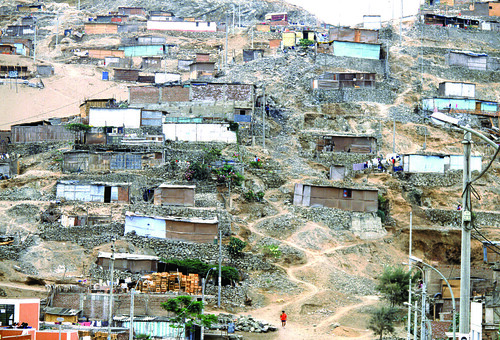URBAN RISK IN THE AMERICAS: A CHALLENGE FOR ACHIEVING THE SUSTAINABLE DEVELOPMENT GOALS
 Photo: Melissa Farlow / AURORA |
1. BACKGROUNDDisaster risks related to hazards such as tropical cyclones, flooding, earthquakes, droughts and tsunamis; as well as risks related to technological hazards 1, constitute an important challenge for development. During 2011 only, 302 disasters took 29.782 lives, affected 206 million people and caused damages estimated in 366.000 million dollars.. |
_______________________________________________________________________________________________
Whereas developing countries and the most vulnerable people are under a great risk, losses such as the eastern Japan large-scale earthquake and tsunami, show an increase in global social and economic losses due to the increasing magnitude and frequency of disasters. Therefore, the disaster risk reduction (DRR) constitutes one of the major challenges for the region´s sustainable development, and in this context, the reduction of vulnerability and exposure to risk, as well as the increase of resilience, require an integral approach (public and private) for the incorporation of strengthening mechanisms such as public and private investment planning systems on infrastructure and social protection.
The Hyogo Framework for Action 2005-2015 (HFA), the international agreement that guide the governments, communities and private sector to promote a culture of prevention and disaster management in order to minimize the loss of human lives and economic damages due to natural hazards and increase resilience at regional, national and local level; establishes five priorities for action that draw practical directions for all the key actors involved in disaster risk reduction.
2. Urban Risk in the Americas: A challenge for achieving the sustainable development goals
Currently more than 75% of the population in the Americas lives in urban areas. According to the projections made for 2030 this percentage will most likely increase to approximately 85%. The percentage of urban population in North America will reach 83-84%; whilst in the Latin America and Caribbean region it will be 87-88% . In this regard, it could be argued that risk management and climate change adaptation actions are, directly or indirectly, inherently related to urban planning and development processes.
The concept of "urban area" is used here in a broad sense, referring to the territory upon which the interventions that allow the concentration of people and productive activities in the city physical space are projected. "A balanced territorial development rarely results to be only urban or rural and requires complementarity and synergy among all its components. The interaction between territories and its economic, environmental and social independence requires an integrated approach" .
Global campaign 2010-2015 "Making Cities Resilient: My City is Getting Ready!"
This campaign is focused on increasing the capacity of local level to face the challenges caused by disasters and climate change. Worldwide, more than 1,000 local governments already participate in the campaign to making cities more resilient. Within the framework of the Global Campaign, UNISDR supports the "Urban Risk Thematic Platform" which is conceived as a technical support instrument for cities in the Americas. The Regional Platform for Urban Risk offers a space for exchange experiences and discussion that allow the enrichment and innovation of collective efforts towards the strengthening of communities and governments resilience to disasters. Based on the work undertaken by previous platforms and the outcomes recently obtained, the following subjects have been suggested for the development of the main topic on urban risk during the regional platform:
1. Decentralization and strengthening capacities of local governments on disaster risk management and climate change adaptation.
2. Cooperation mechanisms for capacity strengthening on DRR and CCA at local level
3. Session goal
The session goal will be to promote the political commitment of local and national governments towards the urban risk reduction through:
1. Highlighting progress on the enhancement of local government capabilities regarding disaster risk management and climate change adaptation within the decentralization process.
2. Identifying cooperation mechanisms at local, national, regional and global level to strengthen the local governments' capacity and knowledge on DRR and CCA aiming towards the reflection on both subjects during planning and development processes.
4. Session scheme and issues to be addressed
It is proposed that the discussion of this main topic should be organized in two sessions:
1. DRR Decentralization: Strengthening of local government capacities
For this session the participation of representatives of local and national governments is suggested in order to address issues concerning the implementation of institutional frameworks that seek to facilitate decentralization processes and how these have integrated DRR and CCA considerations. Particularly aiming at deepen aspects such as: resource allocation and capacity strengthening; the use of tools that allow the monitoring, evaluation and accountability of actions undertaken and invested resources at both national and local level (e.g. HFA monitor and LG-SAT). The session will be complemented with the presentation of three examples by countries with decentralization processes at different phases of implementation. One of the components could focus on the application of existing instruments and tools to review the progress at local level and how this information is used for planning purposes at the national level.
2. City-to-city learning: Capacity building instrument
During this session, the campaign partners and cities will be invited to present the existing exchange approaches and to share knowledge and experiences. Special attention will be paid to the role that cooperation through cities exchanges can play in supporting local governments regarding the improvement of applying the 10 essential for making cities resilient, and how this is reflected in planning and development processes. It is suggested that each session panel is composed of four panelists that will share their experiences in a brief presentation offering a vision for action. In addition, a question and answer session will follow, and the presentation of recommendations and urban risk management opportunities in the region will presented by the panelists. The basic recommendations obtained from the session will contribute to the outcome of the Regional Platform Declaration, as well as a contribution to the IV Session of the Global Platform in 2013, and to the development process of the 2015 Post-Hyogo framework for disaster risk reduction.